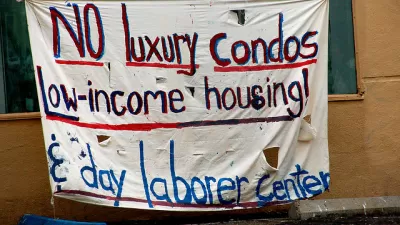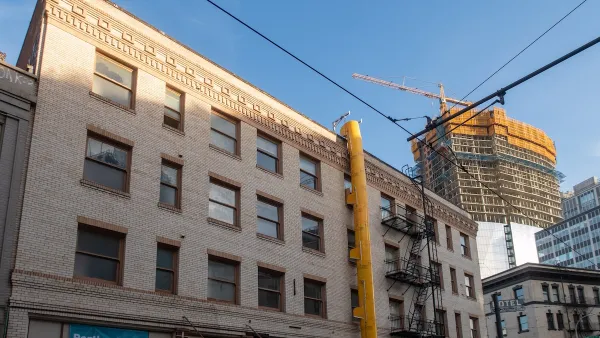Now that tech companies have "discovered" Portland, Oregon, longtime residents question whether the progressive city has done enough to protect them from displacement. Sound familiar?

In the past few years, major tech companies like Google, Airbnb, and Amazon have opened offices in Portland. As housing prices, rents, and evictions skyrocket, the specter of San Francisco looms large.
But a fate of displacement and unattainable housing is not necessarily inevitable, Alana Semeuls points out in The Atlantic—if the city takes action:
[I]t’s not tech or newcomers that are solely to blame. Portland hasn’t been able to slow its rental crisis because in a city that prides itself on progressivism, many of the traditional tools used to create more affordability are off the table.
Semeuls notes a lack of protections for tenants in Portland, as well as throughout the state. In September 2015, conditions drove the Community Alliance of Tenants, a nonprofit, to declare a renter state of emergency.
Thanks in part to pressure from CAT and other groups, the city has begun enacting some tenant protections and affordability measures. A month after CAT's petition, the City Council declared its own housing emergency, and the mayor promised $20 million for affordable housing projects in North and Northeast Portland. Tech companies have also expressed interest in keeping Portland affordable—having moved there, Semeuls writes, in part to avoid the expense of being in San Francisco.
But these efforts have met resistance from some Portland residents who oppose increasing neighborhood density. As the debate continues to play out—and, some say, call the city's progressive identity into question—CAT’s executive director notes: "There are limits to white urban liberalism. When it comes to housing and schools, all of that goes out the window."
FULL STORY: Can Portland Avoid Repeating San Francisco’s Mistakes?

Maui's Vacation Rental Debate Turns Ugly
Verbal attacks, misinformation campaigns and fistfights plague a high-stakes debate to convert thousands of vacation rentals into long-term housing.

Planetizen Federal Action Tracker
A weekly monitor of how Trump’s orders and actions are impacting planners and planning in America.

In Urban Planning, AI Prompting Could be the New Design Thinking
Creativity has long been key to great urban design. What if we see AI as our new creative partner?

California Creates Housing-Focused Agency
Previously, the state’s housing and homelessness programs fell under a grabbag department that also regulates the alcohol industry, car mechanics, and horse racing.

Chicago’s Ghost Rails
Just beneath the surface of the modern city lie the remnants of its expansive early 20th-century streetcar system.

Baker Creek Pavilion: Blending Nature and Architecture in Knoxville
Knoxville’s urban wilderness planning initiative unveils the "Baker Creek Pavilion" to increase the city's access to green spaces.
Urban Design for Planners 1: Software Tools
This six-course series explores essential urban design concepts using open source software and equips planners with the tools they need to participate fully in the urban design process.
Planning for Universal Design
Learn the tools for implementing Universal Design in planning regulations.
planning NEXT
Appalachian Highlands Housing Partners
Mpact (founded as Rail~Volution)
City of Camden Redevelopment Agency
City of Astoria
City of Portland
City of Laramie





























